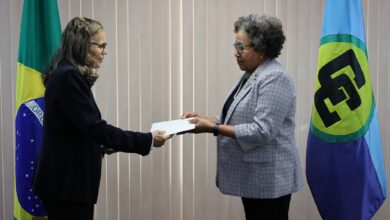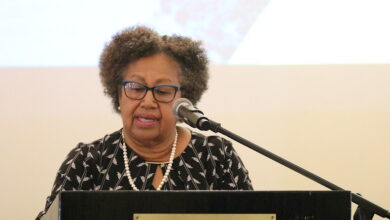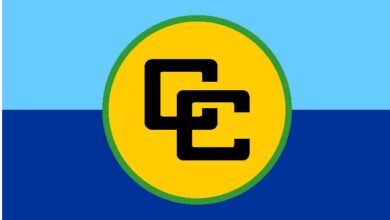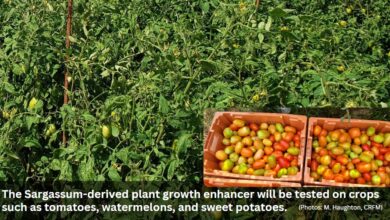INTRODUCTION
The Fifth Annual General Meeting of the Pan Caribbean Partnership Against HIV/AIDS (PANCAP) was held at the Crowne Plaza Hotel, Port-of-Spain, Trinidad and Tobago, on 31 October to 2 November 2005.
Under the theme Sustaining a Best Practice through Partnership, the meeting’s objectives were to update and analyse the work of the approximately 77-member partnership, over the past year and to provide policy guidelines that would enable greater efficiencies and effectiveness in the ongoing fight to reduce the incidence and spread of the HIV/AIDS epidemic.
Representatives to the meeting included the Hon John Junor, Minister of Health, Jamaica and Dr. Marceline Dahl-Regis, Chief Medical Officer, The Bahamas who co-chaired the meeting and Ms. Yolanda Simon, Chief Executive Officer, Caribbean Regional Network + (CRN+) who chaired the Closing Session.
Representation also came from high level officials of thirteen Member States of the Caribbean Community (CARICOM), officials from CARICOM Associate Member States, those from the wider Caribbean and Brazil; several regional organisations and institutions representing labour, youth, the private sector, the academic community; bilateral and multilateral institutions and Donor Agencies, such as the Canadian International Development Agency (CIDA),the Department for International Development (DFID), the German Development Bank, the German Technical Cooperation (GTZ) agency, the Global Fund for AIDS, Tuberculosis and Malaria, the Pan American Health Organization (PAHO), UNAIDS, UNICEF and the UNDP. There were also special invitees from, the Coalicion de SIDA (AIDS Coalition), the Caribbean Social Marketing for HIV/AIDS Prevention, the CHART/JHPIEGO Caribbean VCT Programme, the Enhanced Support to HIV/AIDS in the Caribbean Region (ESAC) Programme, Jamaica AIDS Support for Life, and the National HIV/AIDS Alliance.
The Agenda covered a wide range of issues including an analysis of international and regional developments with implications for PANCAP; implementation of the Caribbean Regional Strategic Framework (CRSF) and engagement with development partners in respect of enhanced collaboration. The Agenda also gave focus to international issues including the development of international partnerships through south/south cooperation as well as engagement with development partners. A number of Core Partners reported on the activities with respect to HIV/AIDS prevention control.
OPENING CEREMONY
The Pan Caribbean Business Coalition on HIV/AIDS was launched during the Opening Ceremony held in the evening of 31 October 2005 where the central chord of the presentations was building and sustaining partnerships. Among the special guests at this ceremony were: H.E. Edwin Carrington, Secretary-General of Caribbean Community (CARICOM) and Sir George Alleyne, United Nations (UN) Special Envoy for HIV/AIDS in the Caribbean.
Dr. Edward Greene, Assistant Secretary-General, CARICOM Secretariat, and Chair of this session, in brief remarks emphasised the need for all institutions and agencies to build and sustain partnerships. In welcoming the Business Coalition to PANCAP, he stated that “[it] was a vital asset and catalyst for forging new directions and for consolidating best practices”.
Mr. James Moss-Solomon, President of the Caribbean Association of Industry and Commerce (CAIC) and designated Chair of the Coalition, in his remarks informed that the overarching goal of the Coalition was to decrease the prevalence of HIV/AIDS in the Caribbean, and specific objectives included mobilising business coalitions at the national level to direct resources towards reducing the prevalence of HIV/AIDS especially in the work place. Mr. Moss-Solomon stated that the Coalition must be an effective partner in the Partnership. He informed that a working committee has been appointed to elaborate on more concrete plans for the delivery of these objectives.
Dr. Peter Piot, Executive Director, UNAIDS referred to the challenge at the national, regional and global levels of effective implementation and delivery to persons on the ground and, in this regard, advocated that emphasis be placed on effective leadership, management, coordination and harmonisation. Dr. Piot reiterated UNAIDS’ and his own personal support for PANCAP.
Ms. Sandra Pepera, Head, DFID, Caribbean, in her presentation informed the gathering of the new initiative with the private sector being undertaken by DFID, which involved working closely with persons living with HIV/AIDS (PLWA) in the hotel sectors of Barbados and Jamaica.
The Hon. Dr. Denzil Douglas, Prime Minister, St. Kitts and Nevis delivered the keynote address in which he stressed the need for partnerships and dedicated resources for accelerated implementation.
In what could be described as a successful launch and opening ceremony, Dr. Bilali Camara, former Head of Special Programme on STI/HIV/AIDS, CAREC and Ms. Joan Atkinson, Senior HIV/AIDS Technical Adviser, USAID Caribbean Regional Programme, were designated Champions for Change. Two representatives were vested on their behalf, by H.E. Edwin Carrington.
Delegates and invitees witnessed a photographic exhibition depicting developments in the Parnternship since the Fourth Annual General Meeting, in October 2004.
GLOBAL TRADE TEAMS: PRINCIPLES, VISION, AND SCOPE OF DEVELOPMENT COOPERATION
In a panel discussion led by Drs. Peter Piot, and Edward Greene, the issue of development cooperation and the challenges being faced by the Region in implementing HIV/AIDS programmes and policy directives for going forward were highlighted. The presentations were made within the context of the recommendations from the Working Groups for the Global Task Team (GTT) and focused on the following issues:
(i) Options for further coordination within the multilateral system;
(ii) Resolving areas of duplication and gaps in the global response to AIDS;
(iii) Streamlining, simplifying and further harmonising AIDS procedures and practices to:a. improve the effectiveness of country led responses; and
b. reduce the burden on managerial and technical capacity of countries.
Chief among the challenges identified by Dr. Piot were lack of respect for ownership, weak national planning, fragmented monitoring and evaluation, accountability issues and oversight, inefficiencies of multilateral institutions and donors to support countries and the need for harmonisation and alignment of programmes. Dr. Piot pointed out that countries were in the implementation mode as it related to the Global Fund and that the Region could loose future funding if the rate of implementation of programmes and the utilisation of funds were not accelerated.
Dr. Greene identified strategic communication, streamlining the management systems in the governance of PANCAP, re-structuring the Caribbean Regional Strategic Framework to better complement national plans, harmonising, utilising and monitoring resources mobilised at the regional and national levels, and identifying the true nature of partnership in delivering on strategies for resolving some of the bottle necks in the Region’s implementation plan.
Among the decisions in respect of this agenda item, were the agreement to realign the Caribbean Regional Strategic Framework (CRSF) with national strategic plans and in this regard: convene annual meetings between PANCAP’s RCM and country representatives among other measures; simplify and harmonise requirements for donor reporting, include a capacity-building component in donor funded programmes to ensure their sustainability.
CARIBBEAN REGIONAL STRATEGIC FRAMEWORK
The meeting underscored the relevance of the CRSF as the central mechanism for directing the programmatic direction of PANCAP and the rallying point for mobilisation of resources in support of the CRSF.
It was reported that nine regional projects on HIV/AIDS mainly in the areas of capacity-building, prevention and care/treatment/support in the sum of US$40 million, have come into being through the CRSF. The meeting noted the considerable progress made in the implementation of projects, as well as the difficulties that have been identified, mainly relating to inadequacy of technical capacity and agreed that a Regional Rapid Response Technical Team be mobilised to assist countries and agencies in implementing projects.
Other decisions were the immediate revision of the current CRSF framework which expires in 2006 and support for the proposal submitted by the Caribbean Vulnerable Communities (CVC) subject to identifying the best modality for its implementation.
IMPACT OF PROGRAMMES ON PANCAP COUNTRIES
Through support from PANCAP, several initiatives have had an impact on countries within the network. Over 50 students including government officials have received Masters Degrees and other higher levels diplomas between 2003 and the present time. The University of the West Indies (UWI) has been able to modify its curriculum and increase its offerings in the areas of HIV/AIDS in 127 courses across its three campuses and UWI HIV/AIDS Response Programme (UWIHARP) and Caribbean HIV/AIDS Research and Training Project (CHART) were successfully launched. Staffing for CRN+ s, upgrade of CAREC’s facilities, support for CCNAPC Annual General Meetings, research publications for the Caribbean Health Research Council (CHRC) and the launch of the mini-grants programme managed by the CARICOM Youth Ambassadors (CYAs) were areas that also received support from PANCAP.
GFATM GRANTS
As of 15 September 2005, the Global Fund Secretariat had approved 317 grants, and disbursement was in the order of US$1.5 billion, 11 percent of which went to Latin America and the Caribbean. Several countries of the Region received GFATM grants in addition to two that were awarded at the regional level to address HIV/AIDS, Tuberculosis and Malaria.
These projects are expected to significantly reduce the levels of these infections in the vulnerable groups in these countries. However, the pace of project implementation has been slow due to a number of institutional bottlenecks. These include, inter alia, the capacity of sub-recipients to expeditiously implement projects with are being funded from multiple sources and negotiations with GFATM for changes to coverage indicators.
The Partners agreed that steps will be taken to increase the rates of implementation and Donors have pledged their support for this venture.
REPORT FROM CHAIR OF THE BOARD OF THE GFATM
Dr. Carol Jacobs, Chair of the Board of GFATM highlighted the major policy directions of the Board which provided essential guidelines for grant recipients. Dr. Jacobs informed the meeting that the Early Alert and Response System (EARS) implemented by the Fund provided an opportunity for country partners and stakeholders to monitor their own grants through a set of qualitative indicators.
Dr. Jacobs also raised the issue of the eligibility criteria for those countries considered middle-income.
The meeting agreed that the Regional Coordinating Mechanisms and Country Coordinating Mechanisms should undertake their own monitoring. It was recommended that the issue of eligibility be kept on the table at all times to ensure that Caribbean countries are not side-lined in the process for receiving funds. It was recommended that the use of an accelerated implementation tool, in this case, the Project Implementation Performance Systems (PIPS) be reviewed for use as a unified reporting tool.
FORGING SOUTH-SOUTH COOPERATION WITH BRAZIL
The meeting recorded its appreciation to the Government of Brazil for completing the Memorandum of Understanding (MOU) for signing in late November 2005 by Prime Minister Douglas and Minister of International Partnerships, Brazil. The MOU will give effect to agreements arising out of the PANCAP Mission to Brazil in April 2005, which include:
i. Provision of anti-retroviral drugs by the Government of Brazil to approximately 500 cases identified in the Organisation of Eastern Caribbean States (OECS);
ii. Cooperation in Monitoring and Evaluation, so that CARICOM/PANCAP may benefit from the techniques and models that have been successfully developed in Brazil;
iii. Participation of the Brazil Business Council for HIV/AIDS at the launching of the CARICOM/PANCAP Business Coalition on HIV/AIDS;
iv. Exchange between Brazil and CARICOM/PANCAP in training programmes such as those that are coordinated by the Caribbean HIV/AIDS Training Initiative (CHART).
v. Support for bilateral agreements between the Governments of Brazil and Suriname for HIV/AIDS prevention activities;
vi. Collaboration between CARICOM/PANCAP and Brazil youth exchange programmes related to prevention and control of HIV/AIDS
In addition, another Memorandum of Understanding will be signed between Brazil and Barbados, in collaboration with the Pan American Health Organisation (PAHO) which focuses on laboratory testing and strengthening the support for networks of persons living with HIV/AIDS.
UNICEF GLOBAL CAMPAIGN FOR CHILDREN AND HIV/AIDS
The Meeting supported the UNICEF Global Campaign on United for Children against HIV/AIDS which stresses increased prevention, including mother-to-child transmission and ante-natal and pediatric treatment to prevent opportunistic infections among children and protection of orphans and vulnerable children.
The Caribbean launch of this campaign will take place in Trinidad and Tobago on the occasion of the Summit on Children and HIV/AIDS.
HIV/AIDS INITIATIVE BY UNIVERSITY OF GUYANA
The meeting expressed its pleasure at the initiative of the University of Guyana Faculty of Sciences and Medicine which has introduced a course on HIV/AIDS/STIs which is offered to all students in the faculty. Over 88 persons have been awarded certificates. The University of Guyana has placed emphasis on HIV/AIDS related research and on improving laboratory facilities.
CCNAPC
The Caribbean Coalition of AIDS Programme Coordinators reported an active year which placed emphasis on advocacy and policy development in the area of the reduction of stigma and discrimination. In this regard, the CCNAPC sponsored several workshops aimed at building capacity of officers of national HIV/AIDS programmes.
SIXTEENTH INTERNATIONAL AIDS CONFERENCE
Under the theme Time to Deliver, the sixteenth International AIDS conference will be held on 13-18 August 2006, in Toronto, Canada. This year’s conference is slated to have a different format with emphasis being placed on more focused discussions and more interaction between presenters and audience.
Efforts have been made to make the conference more accessible to a wider audience through the award of scholarships as well as online participation.
Members of PANCAP were invited to attend this conference both as an institution and in their individual capacities.
More information on the Sixteenth Conference could be found at the website http://www.aids.org .
CHAMPIONS FOR CHANGE II: REGIONAL CONFERENCE OF FAITH-BASED ORGANISATIONS (FBOs)
The meeting was updated with arrangements for the Champions for Change II: Conference of Faith-based organisations to be held in Guyana on 22-23 November 2005. With funding from DFID, this Conference will bring together approximately 100 persons from Christian, Muslims, Bahai, Hindus and Rastafarians organisations to essentially discuss their role in reducing HIV/AIDS stigma and discrimination.
It was noted that FBOs are strategically positioned to influence and effect change and that strategies to assist them must involve capacity building, technical support for programme development and mobilisation of resources.
A number of development partners pledged support for the Champions for Change process.
LAUNCH OF CHAMPIONS FOR CHANGE PUBLICATION
One of the highlights of the Closing Ceremony was the launch of the PANCAP’s Publication entitled Champions for Change: Reducing HIV/AIDS Stigma and Discrimination in the Caribbean. This publication produced by the PANCAP Coordinating Unit with funding from DFID essentially chronicles the proceedings of the Champions for Change Conference; Reduce Stigma and Discrimination Against Persons Living with HIV/AIDS, a ground-breaking and very stimulating event which was held in St. Kitts and Nevis in November 2004.
APPRECIATION
The meeting expressed appreciation to the Caribbean Association of Industry and Commerce (CAIC), co-host of the Opening Ceremony, to sponsors, CIDA, DFID, the World Bank and the Global Fund, UNICEF and USAID for supporting the Meeting, and to all delegates for their valued interventions which contributed to the success of the meeting.
CARICOM Secretariat
2 November 2005






